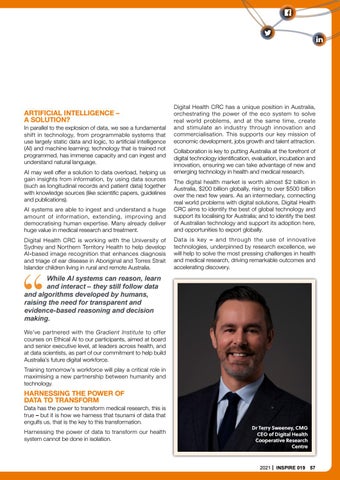CHRISTOPHE KEREBEL
CHRISTOPHE KEREBEL
My Twitter : @chriskere CHRISTOPHE KEREBEL
ARTIFICIAL INTELLIGENCE – A SOLUTION?
In parallel to the explosion of data, we see a fundamental shift in technology, from programmable systems that use largely static data and logic, to artificial intelligence (AI) and machine learning; technology that is trained not programmed, has immense capacity and can ingest and understand natural language. AI may well offer a solution to data overload, helping us gain insights from information, by using data sources (such as longitudinal records and patient data) together with knowledge sources (like scientific papers, guidelines and publications).
Digital Health CRC has a unique position in Australia, orchestrating the power of the eco system to solve real world problems, and at the same time, create and stimulate an industr y through innovation and commercialisation. This supports our key mission of economic development, jobs growth and talent attraction. Collaboration is key to putting Australia at the forefront of digital technology identification, evaluation, incubation and innovation, ensuring we can take advantage of new and emerging technology in health and medical research.
AI systems are able to ingest and understand a huge amount of information, ex tending, improving and democratising human expertise. Many already deliver huge value in medical research and treatment.
The digital health market is worth almost $2 billion in Australia, $200 billion globally, rising to over $500 billion over the next few years. As an intermediary, connecting real world problems with digital solutions, Digital Health CRC aims to identify the best of global technology and support its localising for Australia; and to identify the best of Australian technology and support its adoption here, and opportunities to export globally.
Digital Health CRC is working with the University of Sydney and Northern Territory Health to help develop AI-based image recognition that enhances diagnosis and triage of ear disease in Aboriginal and Torres Strait Islander children living in rural and remote Australia.
Data is key – and through the use of innovative technologies, underpinned by research excellence, we will help to solve the most pressing challenges in health and medical research, driving remarkable outcomes and accelerating discovery.
While AI systems can reason, learn and interact – they still follow data and algorithms developed by humans, raising the need for transparent and evidence-based reasoning and decision making. We’ve partnered with the Gradient Institute to offer courses on Ethical AI to our participants, aimed at board and senior executive level, at leaders across health, and at data scientists, as part of our commitment to help build Australia’s future digital workforce. Training tomorrow’s workforce will play a critical role in maximising a new partnership between humanity and technology.
HARNESSING THE POWER OF DATA TO TRANSFORM
Data has the power to transform medical research, this is true – but it is how we harness that tsunami of data that engulfs us, that is the key to this transformation. Harnessing the power of data to transform our health system cannot be done in isolation.
Dr Terry Sweeney, CMG CEO of Digital Health Cooperative Research Centre
2021 | INSPIRE 019 57
